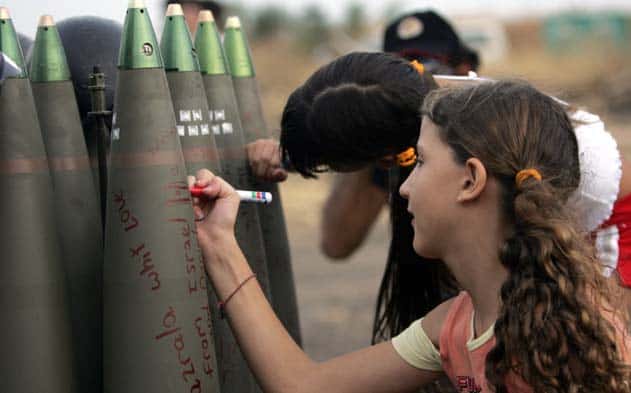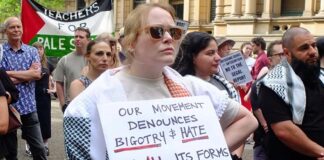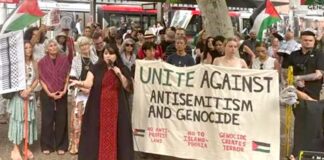Israeli academic Marcelo Svirsky, now at Wollongong Uni, explains his opposition to Zionism and why he supports BDS, in a speech from Solidarity’s Keep Left conference
“I was born to a Jewish family and lived in Israel most of my adult life. While living in Israel, one needs to lack a heart not to realise that the privileges of Jewish-Israelis stem from the continuing dispossession of the Palestinian people, not to realise that the political and economic superiority of Jewish-Israelis was established on the basis of the ethnic cleansing of Palestine in 1948.
One really must be self-absorbed not to comprehend that the privileges of Jewish-Israelis are the flip side of the racial discrimination of the Palestinian citizens as much as they are profit of the military occupation of the West Bank and Gaza.
This is an unearned and tainted privilege, and this Jewish privilege has a name—it is called “the only democracy in the Middle East”.
In the “only democracy” Jews have rights and Palestinians have struggles for rights. In the “only democracy” the right of Palestinian citizens to choose a place of residence is restricted by law; their right to marriage and form a family with Palestinians non-citizens is limited by law; their right to equal social welfare and budget allocation does not exist; their right to commemorate the Nakba is forbidden; their school principals are appointed by the Israeli security services; their language is studied by Israelis as the language of the enemy and only to fill the ranks of the intelligence units in the army—and this is only a partial list.
The “only democracy” is the only democracy that for half a century imposes a military occupation on four million people depriving them of all basic rights and self-determination; it is the same “only democracy” that since 2007 sieges and blockades the Gaza Strip to prevent a Palestinian national reunification that might lead to political negotiations. How a regime based on such brutal forms of military occupation be defined as a democracy, we leave to the Western media to explain.
But the “only democracy” could not have become “the only democracy” without compelling its youth to military indoctrination and without a culture of Abrahamic sacrifice in which parents celebrate the conscription of their children. In this “only democracy” young people refusing to become “soldiers for life”, sit in jail. And while they sit in jail, their peers train themselves in crimes against humanity.
This is the same regime where the police help fascist thugs beating up leftists demonstrators opposing war and racism; and it is in this very “only democracy” where people gather on hillsides close to Gaza to watch and cheer as the Israeli army drops bombs on civilians and slaughters entire families; with every impact and explosion, handclapping.
This is the cultural infrastructure of the “only democracy”, the cultural infrastructure of the Jewish state, the system of life of a people unwilling to transform or compromise.
Take this massive and despicable commitment to racism, war, segregation and Jewish privilege, add to it the full support of the hegemonic Western powers Israel relies on, and then one can understand why the Israeli leadership never had a real incentive to change the status quo.
As a strategy of change, there are, I believe, two interrelated levels we must work on. At one level, solutions must be sought in the long term, and on another level—it is imperative to reach solutions in the short term.
In the long term, I am a strong believer in the necessity for cultural transformation.
For more than 20 years I joined Israelis of conscience and together with Palestinians I was engaged in different struggles for justice. We never accepted the ethnic and racial assumptions and policies of the “only democracy”.
But many of you are probably aware that reasoning with Zionists is far from being an easy mission. Experience demonstrates that Zionists use the practice of dialogue to impose a false symmetry that erases the simple fact that there are oppressors and oppressed; occupiers and occupied. And nevertheless, there is no other solution to this problem but the wholesale transformation of the infrastructure of society; this is the work of a generation.
In the short term however, we face a political and humanitarian urgency to end the military occupation of the West Bank, to end the siege of Gaza, to dismantle the separation Wall, and to put to an end the never-ending murderous military campaigns launched by Israel to avoid political solutions.
Since 1948 hundreds of United Nations resolutions have condemned Israel’s discriminatory policies as illegal; notwithstanding, Israel continues violating international law and human rights, expanding its colonies in the West Bank and East Jerusalem, displacing Palestinian families, and persisting in apartheid and oppressive actions, policies and legislation.
Israel has violated 28 resolutions of the UN Security Council and more than 100 resolutions of the General Assembly including resolution 194 which demands Israel to respect the right of Palestinian refugees to return to their homes following the ethnic cleansing of 1948. It is beyond clear that all forms of international intervention and peace-making to change Israel’s policies have failed. It is this reality that must be changed without delay.
BDS
As the Palestinian sociologist Lisa Taraki explains, when diplomacy, persuasion and dialogue fail—it is the time to adopt pressure as a tactic to advance change.
BDS stands for Boycott, Divestments and Sanctions—and it is a political call made by the Palestinian civil society in 2005.
BDS calls to reject relations, through boycott, divestment and sanctions, with Israeli and other international institutions and companies that are involved in the perpetuation of apartheid and discriminatory policies including the military occupation of the West Bank, East Jerusalem and the Gaza Strip.
These measures target principally institutions and companies operating in or involved with the occupation of the West Bank, east Jerusalem and the siege on Gaza.
Also, the academic and cultural boycott launched in 2004 targets the state of Israel as a whole.
The academic and cultural boycott calls to refrain from participation in any form of academic and cultural cooperation, or joint projects with Israeli institutions, including cultural work in Israel; it advocates a comprehensive boycott of Israeli institutions at the national and international levels, including suspension of all forms of funding to these institutions; and it promotes divestment from Israel by international academic institutions.
The basic idea of the boycott is indeed very simple: one cannot maintain normal political, economic, academic and cultural relations of exchange with a belligerent regime that has an apartheid heart, a settler colonial body, and it refuses to change.
Boycotting Israel is not a principle but an urgently needed non-violent form of pressure on the Israeli leadership and on the Israeli society that can bring about compliance with international law and the requirements for a just peace.
The aim of the boycott is to enable new conditions of negotiation in which Israel realises that much is at stake.
I understand that for many people, particularly those in the Jewish communities in the diaspora, endorsing the boycott is for them far beyond their possible criticism of Israel.
Why not to boycott?
For some, boycotting the nation who survived the holocaust seems unthinkable and perhaps a contradiction. My answer is that you are drawing the same terrible conclusions of the holocaust that Israel wants us to adopt. One does not respect the Jewish victims of the holocaust by legitimising the oppression of Palestinians by Israel. This is the contradiction.
Others refuse to endorse the boycott because they claim that boycotting means undermining the very possibility of dialogue with Israelis which is necessary to peace. Boycotts are destructive and divisive, they claim.
But the reality is that we don’t need boycotts to have a divisive state of affairs; it is the Israeli apartheid and occupation that makes the region into a world of divisions and segregations.
What is more, one must be aware that for Israel dialogue means one thing and one thing only: that the world must accept Israel as a Jewish state, a state that privileges Jews at the expenses of the Palestinians. For Israel dialogue is not a platform to reach justice but one to perpetuate its current regime.
Others still are reluctant to endorse the boycott because they fear of harming the economic life of Israelis and indirectly, of the Palestinians.
In other words, according to this claim we should legitimise the current economic system of oppression that profits from the discrimination of the Palestinian citizens, from the occupation of the West Bank, and from the Palestinian lands and property that are being expropriated by Israel since 1948. Nothing can be more incoherent.
Do please tell us that a just process of political negotiations is underway; tell us that Israelis are willing to experiment with compromise and give up on their privileges for the sake of a shared and egalitarian future. Prove that these are real processes and I will tell you, “let us wait with the boycott.” But given that nothing has helped to change the status quo—diplomacy, persuasion or dialogue—not endorsing the boycott is legitimising the continuing oppression of Palestinians by Israel.
More than everything else, it is the silence of people of good will that must stop. We do have a choice, and the right choice is now pressing on Israel by means of boycotts.”






